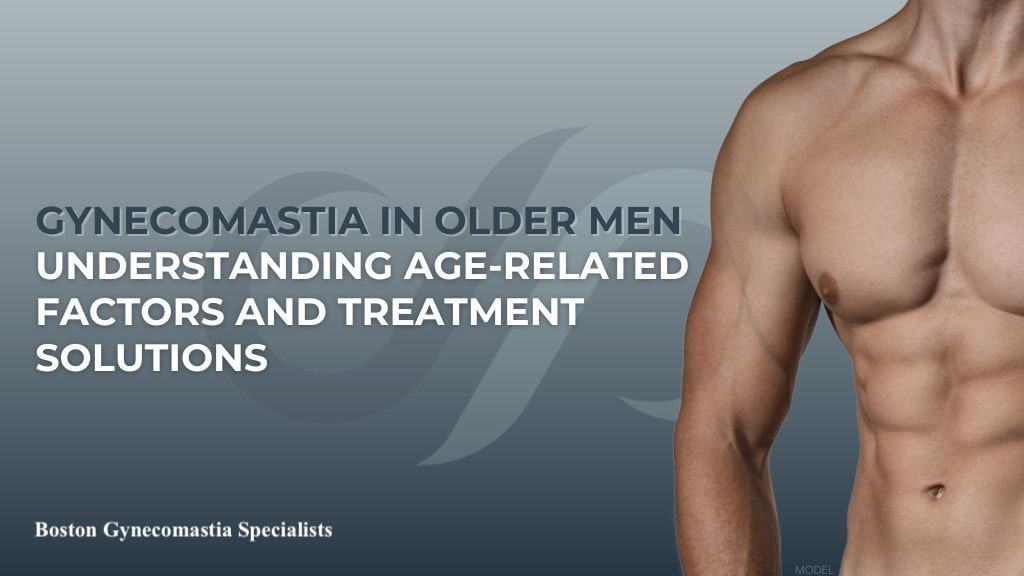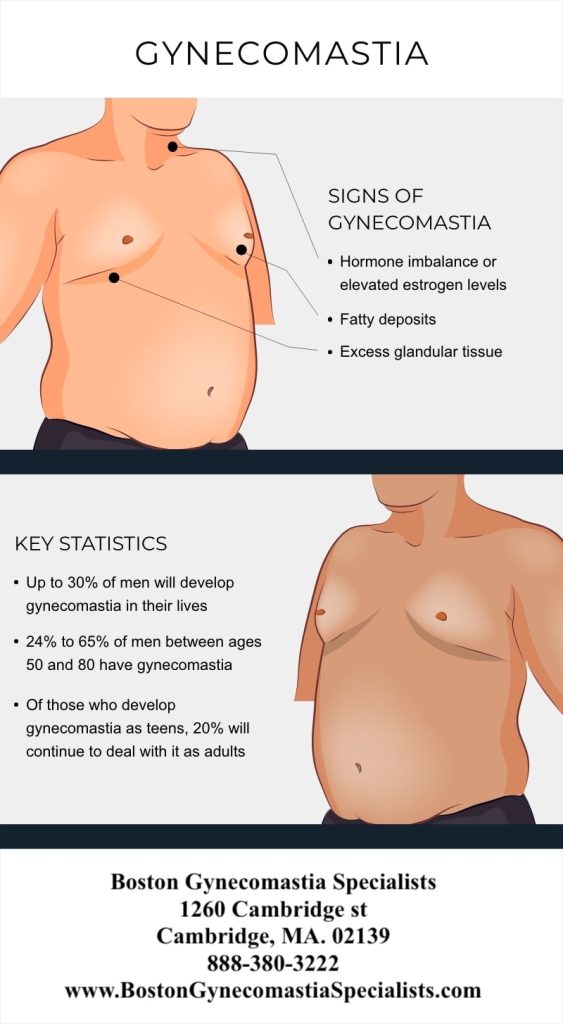
Frequently Asked Questions
Gynecomastia is a medical condition characterized by the enlargement of male breast tissue. While it can occur at any age, it becomes increasingly prevalent among seniors. This can be due to various factors, including hormonal changes, medications, and age-related health conditions.
In this comprehensive overview, we will talk more about what gynecomastia is, how aging can result in gynecomastia, treatment options, risks associated with surgery, frequently asked questions, and more.
At the Boston Gynecomastia Specialists, we are here to help get you going in the right direction. Schedule an individualized in-person consultation today to meet with our doctors.
What is Gynecomastia?
Gynecomastia, often referred to as “man boobs”, is the enlargement of breast gland tissue in males. It can affect one or both breasts, resulting in a swollen appearance, and puffy nipples. This condition can cause psychological distress and self-consciousness in affected individuals, impacting their quality of life and self-esteem.
It is also possible that male breasts develop due to excess fatty tissue (either in addition to the gland tissue, or a combination of both). Our doctors at the Boston Gynecomastia Specialists will walk you through your personalized treatment plans based on your condition.
Aging and Gynecomastia
Aging is a significant factor in the development of gynecomastia in seniors. As men age, hormonal changes occur. This usually includes a decrease in testosterone levels and an increase in estrogen levels. In turn, this hormonal imbalance can lead to excess breast gland tissue.
Additionally, certain medical conditions and medications commonly associated with aging can contribute to the development of gynecomastia in older men. These can include prostate enlargement, liver disease, and the use of medications like anti-androgens, anabolic steroids, or certain antidepressants.
Lifestyle factors such as excessive alcohol consumption, obesity, and sedentary behavior can also exacerbate hormonal imbalances. These can contribute to the accumulation of excess fat in the chest area, further worsening the appearance of gynecomastia.
While there are many causes of gynecomastia, there are a few surgical treatment options that can help solve the condition for good. The next section will dive into more detail about these and more.
Treatment Options
Treatment options for gynecomastia vary depending on the severity of the condition, underlying causes, and individual preferences.
Lifestyle Modifications:
Encouraging seniors to maintain a healthy weight through regular exercise and a balanced diet can help reduce excess fat in the chest area and alleviate the appearance of gynecomastia.
Surgery:
For severe or persistent cases of gynecomastia, surgical intervention may be necessary. Procedures such as liposuction or gland excision (surgical removal of breast tissue) can effectively reduce breast size and improve chest contour.
Counseling and Support:
Psychological counseling and support groups can be valuable resources for seniors struggling with the emotional impact of gynecomastia. Addressing body image concerns and building self-confidence are important aspects of comprehensive treatment.
Risks Associated with Surgery
While treatment options for senior gynecomastia can be effective, they are not without risks. Surgical procedures carry inherent risks such as infection, bleeding, scarring, and adverse reactions to anesthesia.
Seniors may face heightened surgical risks due to age-related factors such as impaired wound healing, reduced skin elasticity, and underlying medical conditions.
Prior to gynecomastia surgery, seniors should undergo a thorough medical evaluation to assess their overall health status and suitability for the procedure. Our qualified and experienced gynecomastia surgeon, Dr Edwin Ishoo, will tailor treatment plans to meet individual needs and minimize the risks associated with surgery.
Gynecomastia is a prevalent condition among seniors, and it can significantly impact quality of life. It’s crucial to understand its root causes, available treatments, and associated risks for effective management. By seeking guidance from our skilled healthcare providers and determining suitability for gynecomastia treatment, seniors can alleviate symptoms and restore confidence in their physical appearance.
Is gynecomastia common in seniors?
As men age, the prevalence of gynecomastia increases significantly. This condition is commonly linked to hormonal fluctuations, the use of certain medications, and the presence of age-related health issues.
Can gynecomastia go away on its own?
In some instances, mild gynecomastia may resolve on its own, especially if it is caused by temporary hormonal fluctuations. However, persistent, or severe gynecomastia typically requires medical intervention to address underlying causes and alleviate symptoms effectively.
Are there non-surgical treatments for gynecomastia?
Non-surgical treatments, including hormone therapy, medication adjustments, and lifestyle modifications, may effectively manage gynecomastia symptoms, especially in seniors with mild to moderate cases. However, these approaches may not yield permanent results and are often less effective for significant breast enlargement.
What is the recovery process like after gynecomastia surgery?
The recovery process following gynecomastia surgery varies depending on the type of procedure performed and individual healing characteristics. Following surgery, seniors may experience discomfort, swelling, and bruising during the initial weeks. These typically improve gradually over several months. Adhering to post-operative instructions from the surgeon and attending follow-up appointments are crucial for achieving optimal results.
Are there any long-term complications associated with gynecomastia surgery?
Although gynecomastia surgery is generally safe and well-tolerated, some individuals may experience long-term complications such as scarring, alterations in nipple sensation, and chest asymmetry. Seniors must have a thorough discussion about potential risks and outcomes with our surgeon before proceeding with the procedure.
Schedule Your Consultation
Gynecomastia surgery provides seniors with a transformative solution, offering relief from the physical and emotional burdens of enlarged breasts. Through the removal of excess tissue and the sculpting of a more masculine chest contour, this procedure lets patients reclaim confidence in their appearance.
For seniors thinking about gynecomastia surgery, it’s vital to seek consultation with a board-certified plastic surgeon proficient in male breast reduction procedures. At the Boston Gynecomastia Specialists, we are ready to assist you on your journey to enhanced well-being and self-assurance.
If you believe you may be a candidate for gynecomastia surgery or would like to learn more about our services, we invite you to schedule an individualized in-person consultation and take the first step.
Do you have more questions? Check out some of the most frequently asked gynecomastia questions.
The Boston Gynecomastia Specialists covers the Boston area and beyond. Just some of the main cities of service include:
- Springfield
- Worcester
- Fitchburg
- Framingham
- Newton
- Quincy
- Plymouth
- Cape cod
- Fall River
- Andover
- Lawrence
- Lowell
- Gloucester
- Burlington
- Brockton
- Quincy
- Braintree
- New Bedford
- Manchester, NH
- Burlington, VT
- Providence, RI
- Portland, ME
- Hartford, CT
- and Out-of-town patients!
And don’t worry if you do not live in New England. It is also possible to arrange a virtual consultation for gynecomastia surgery, allowing you to speak with our doctors and get you started in the right direction.
The Boston Gynecomastia Specialists is the premier Greater Boston Gynecomastia Center of excellence. We prioritize delivering exceptional care from your initial consultation to your recovery and beyond. We deeply value the trust you place in us and are committed to upholding the highest standards of patient care. Our team, led by Dr. Edwin Ishoo, a board-certified surgeon specializing in gynecomastia treatment, is devoted to achieving optimal surgical results for each individual. Recognizing that every person is unique, we personalize our approach to meet your specific needs. Whether you have questions or are ready to schedule your personalized in-person consultation, please don’t hesitate to contact the Boston Gynecomastia Specialists today. We’re here to support you every step of the way!
Boston Gynecomastia Specialists
1260 Cambridge st
Cambridge, MA 02139
(888) 380-322

